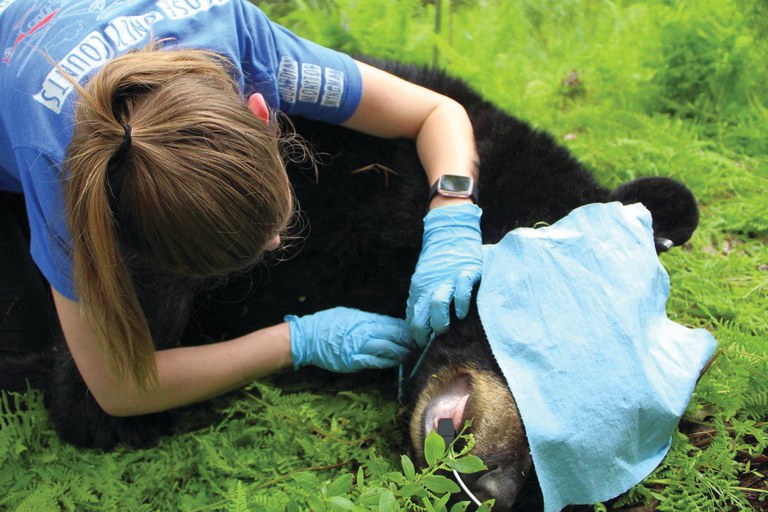Posted: December 2, 2022
Researchers find bears may contribute to tick spread.

Hannah Tiffin, doctoral candidate in entomology, checks a sedated black bear for ticks. Credit: Taylor Miller
Most people probably associate the spread of the blacklegged tick--the primary vector for the pathogen that causes Lyme disease--with deer or mice. But researchers in the college say the tick also may expand its range in Pennsylvania by hitchhiking on another native wildlife species: black bears.
Black bear populations have increased substantially in Pennsylvania in the last few decades, which has coincided with the spread of the blacklegged tick and a significant rise in Lyme disease cases across the state, noted Hannah Tiffin, doctoral candidate in entomology. To better understand these bears' role in tick ecology and dispersal, Tiffin led a recent study examining the presence, abundance, and spatial distribution of ticks on black bears.
"To date, most wildlife studies of blacklegged ticks have looked at two species--the white-tailed deer and the white-footed mouse," Tiffin said. "As a result, there's a lack of research on other animal species in terms of their role in tick dispersal, their suitability as hosts, and their status as reservoirs of disease pathogens."
The researchers assessed tick presence, abundance, life stage, spatial distribution, and seasonality for 278 black bears in 21 central Pennsylvania counties. They found that nearly 71 percent of bears examined had ticks present, all of which were blacklegged ticks. All three life stages of tick were found on bears during the study.
Because black bears can travel long distances--sometimes more than 100 miles--this research suggests that they may be an important factor in tick dispersal in Pennsylvania, said study co-author Erika Machtinger, assistant professor of entomology.
She said, "It's important to understand their role in tick ecology and dispersal, especially in a region with high numbers of Lyme disease cases."
--Chuck Gill
Features
Breaking the Silence on Farm Stress
Farming has always been a demanding profession, but today's farmers face unprecedented pressures that can severely impact their mental health.
Biting Back
Research Targets Vector-Borne Diseases to Save Lives
Leading Forward
Ott brings deep connection to role of dean.


